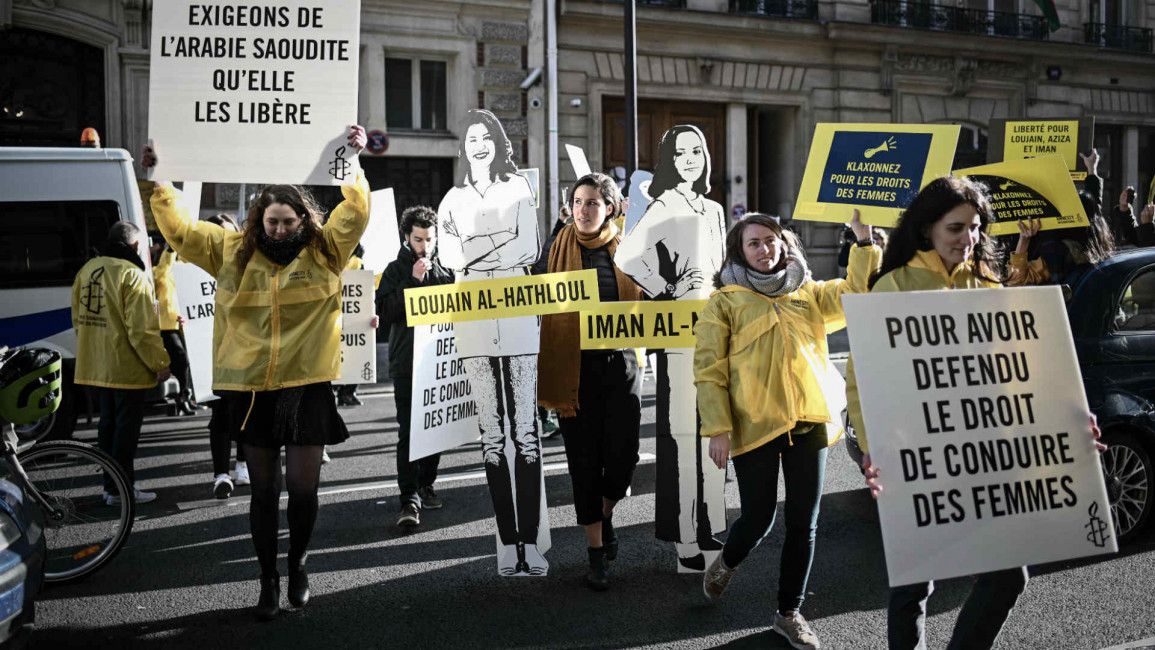'Show trial' of Saudi women activists adjourns without verdict
Prominent activists Loujain al-Hathloul, Aziza al-Youssef and Eman al-Nafjan were among those who attended Riyadh's criminal court after being held for nearly a year without charge.
No journalists were permitted to attend the secretive trial, and 15 foreign diplomats were turned away at the court, according to an anonymous source.
The accused themselves were not told of the charges against them until just before the hearing, according to their relatives.
UK-based Saudi rights activist and founder of human rights group ALQST, Yahya Assiri, told The New Arab that there were in fact eleven women on trial today, who faced three different judges.
According to Amnesty International and the women's relatives, the women have not had access to legal counsel during their detention. They have also been subject to torture and sexual harassment, including threats of rape.
The charges against the women have not yet been publicised, however Assiri said they were "not legal charges", and had "nothing to do with the law", including issues like freedom of speech and communicating with NGOs and the UN Human Rights Council.
Twitter Post
|
He added that Wednesday's proceedings could be considered a show trial.
The women's hearing was changed at the last minute to Riyadh's criminal court rather than the specialised court, according to Loujain al-Hathoul's brother Walid.
The Specialised Court deals with terrorism-related cases, but is often also used to try political prisoners.
Although no reason was given for the change of location, some suspect it was due to increasing international pressure and to confuse the journalists and international diplomats wanting to attend.
Such a last minute change of court is "very, very complicated", Assiri said, adding that the order to do so "must have come from above".
Amnesty International's Middle East campaigns director Samah Hadid was doubtful of any improvement to the women's situation, saying in a statement: "It now seems that the authorities will charge the women's rights activists, after keeping them in detention for nearly one year without any access to lawyers, and where they faced torture, ill treatment and sexual harassment."
However some have taken the last-minute change in proceedings as an indication that the Saudis are giving in to international pressure, as part of a bid to save face after the "PR disaster" of the women's arrest.
"Giving women the right to drive and then arresting and allegedly subjecting the women campaigners to psychological and physical abuse, including sexual abuse was not a smart move," Bill Law, an analyst with The Gulfmatters.com told The New Arab.
He added that the charges or convictions could be downgraded, or there could even be a royal pardon or outright acquittal.
"That would surprise me but with the Saudis, as we have learned, anything is possible," he added.
Their next hearing is due to take place on April 27, acording to Assiri.
More than a dozen activists were arrested in May last year, just a month before the historic lifting of a decades-long ban on women drivers as part of Crown Prince Mohammed bin Salman's so-called modernising reforms.
Earlier this month, state mouthpiece the Saudi Press Agency said the women would be put on trial for "undermining the kingdom's security".
Twenty-nine year old Hathloul was held for more than 70 days in 2014 for attempting to drive from neighbouring United Arab Emirates to Saudi Arabia.
Read more: 'Qahtani present' when Saudi activist was 'beaten, waterboarded, threatened with rape'
The crackdown has further intensified international criticism of Saudi Arabia, which has faced global censure over journalist Jamal Khashoggi's murder in the Saudi consulate in Istanbul last October.
Last week, 36 nations condemned Saudi Arabia over the murder, in a rare censure of the wealthy oil-rich kingdom at the UN Human Rights Council.
Follow Florence Dixon on Twitter: @flo_dix



